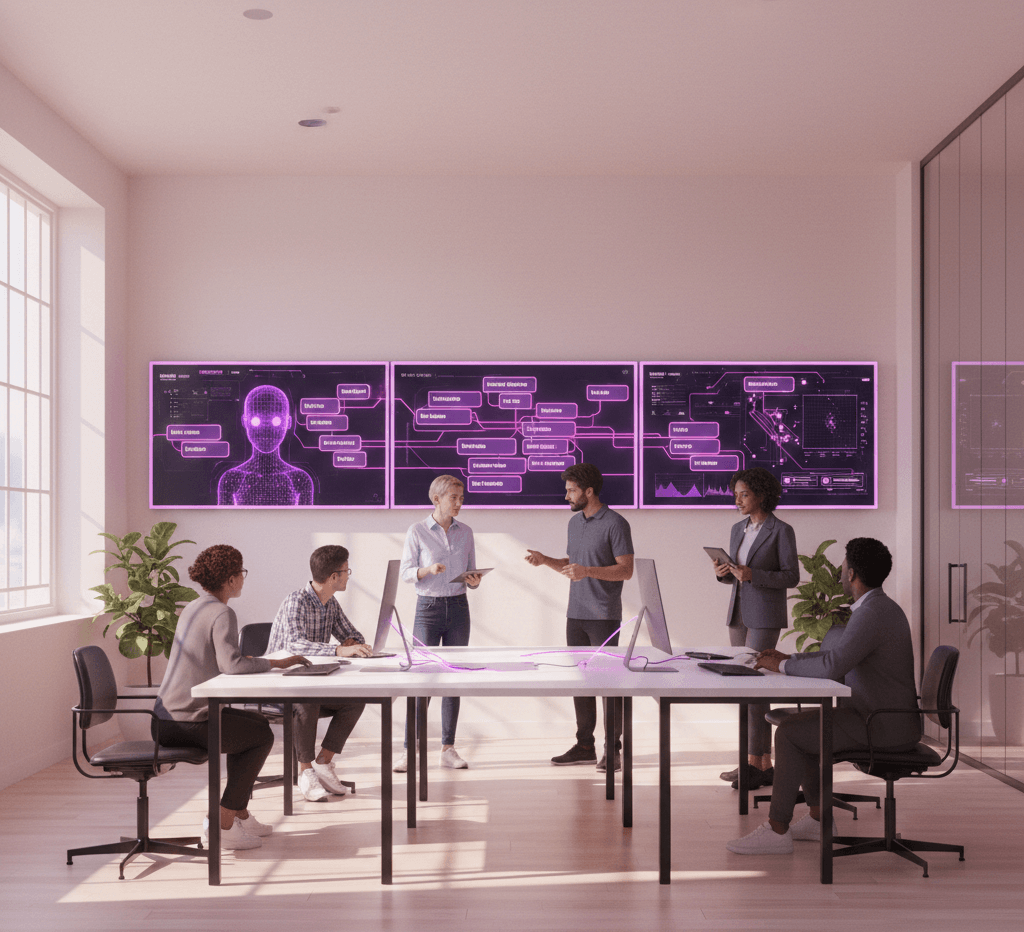“Discover how AI-driven talent acquisition solutions streamline hiring, automate tasks, and improve decision-making for faster, more effective recruitment.”
In today’s fast-paced business world, finding the right people quickly and efficiently is a big challenge. Companies are always looking for ways to get ahead in the race for talent. This is where AI-driven talent acquisition solutions come in. They are changing how organizations find and hire new employees. AI technology makes the recruitment process much smoother and more efficient. This means less manual work and better hiring decisions.
Traditional hiring methods often involve repetitive tasks. Think about sifting through countless resumes, scheduling interviews, and manually tracking candidate progress. These tasks take a lot of time and use up many resources. AI changes this. It automates these steps, freeing human recruiters to focus on more strategic parts of the hiring process.
This article explores how AI technology improves recruitment. We will examine how it automates key hiring steps and discuss the capabilities of solutions like SalesCloser AI. These steps include candidate screening, interview scheduling, and data analysis. These tools reduce manual effort and improve decision-making.
Furthermore, we will highlight how AI integrates with existing CRM systems, supports multilingual hiring, and optimizes strategies through machine learning. This makes the talent acquisition process faster, more cost-effective, and scalable across various industries.
The Foundation: What is AI-Driven Talent Acquisition?
AI-driven talent acquisition uses artificial intelligence to find and hire new employees. It moves beyond simple automation and uses advanced algorithms, machine learning, and data analytics. This improves every stage of the hiring process, including sourcing, screening, candidate matching, and even decision-making.
The market for AI recruitment technology is growing fast. This shows its increasing acceptance. Recruiters are optimistic about AI’s ability to make recruitment more efficient. Many are already experimenting with AI tools. They use these tools to boost candidate engagement. They also streamline sourcing and screening processes.
Historically, recruiting relied heavily on manual work. HR teams manually reviewed resumes. They coordinated interviews by phone. They sourced candidates offline. These methods worked in the past. However, they often meant high costs. They also caused slow hiring times. Plus, they were open to bias. AI recruitment tools address these problems. They use algorithms to automate tasks. These tasks include resume parsing, candidate sourcing, and interview scheduling. This brings scalability and precision to the hiring process.
Automating Key Hiring Steps with AI
AI’s power in talent acquisition is evident in its ability to automate. It handles tasks that usually take time, such as candidate screening and interview coordination.
Competent Candidate Screening: Beyond Keywords
One of the biggest time-wasters in traditional recruitment is resume screening. Recruiters often sift through hundreds, even thousands, of applications, looking for specific keywords. This slow manual process can lead to missing out on good candidates. Sometimes, a resume might not have the exact keywords. However, the candidate could still be a great fit.
AI changes this entirely. AI tools can instantly scan and analyze resumes based on skills, experience, and qualifications. This dramatically reduces the time spent on manual screening, allowing recruiters to review a larger pool of candidates faster.
Beyond keywords, AI systems use natural language processing (NLP), which helps machines understand and interpret human language. This means AI can go beyond surface-level keyword matching. It can understand the context of a candidate’s experience, identify transferable skills, and even pick up on subtle cues that suggest a good fit.
Efficient Interview Scheduling: No More Back-and-Forth
Once candidates are screened, the next big hurdle is interview scheduling. This can be a nightmare. It involves coordinating calendars between candidates and multiple interviewers. There are time zone differences. There are also last-minute cancellations. All of these add to the complexity, leading to much back-and-forth communication.
AI tools for interview scheduling make this process smooth. They integrate with calendars like Google Calendar and Outlook, checking real-time availability. Then, they offer successful candidates convenient time slots. This automation saves a lot of time and reduces recruiters’ administrative workload.
Data Analysis for Better Decision-Making
AI does more than automate tasks. It also provides valuable insights. It analyzes vast amounts of data, which was previously difficult to obtain. This data-driven approach improves hiring precision and consistency.
AI tools can analyze historical hiring data, helping to predict candidate success, cultural fit, and long-term retention. By utilizing real-time insights and trend analysis, companies can make more informed hiring strategies.
SalesCloser AI: A New Angle in Talent Acquisition
While SalesCloser AI is known for powering AI agents that improve sales performance, its underlying capabilities offer significant benefits for talent acquisition. How it manages conversations, analyzes sentiment, and provides data-driven insights translates directly into a more efficient hiring process. Think of how an AI agent enhances a sales interaction; a similar impact can be seen in candidate engagement.
Automating Candidate Engagement
SalesCloser AI’s AI agents use Natural Language Processing (NLP). This allows them to understand and respond to customer—or, in this case, candidate—queries with human-like comprehension. Imagine a candidate with a common question about a job or the application process. An AI agent powered by SalesCloser AI can handle these FAQs, providing instant, accurate responses. This dramatically improves the candidate experience and frees recruiters from repetitive inquiries.
This capability works much like dedicated AI-powered chatbots in recruitment. These agents provide real-time communication, answer common questions, and even help schedule interviews, improving the candidate experience.
Sentiment Analysis and Intent Recognition
The AI agents within SalesCloser AI include sentiment analysis capabilities. They can gauge emotions and recognize intent. In recruitment, an AI agent can detect whether a candidate is genuinely interested, pick up on subtle signs of disengagement, or identify potential concerns. This allows recruiters to intervene at the right time, addressing issues proactively and helping keep candidates engaged throughout the process.
This feature is particularly beneficial during initial screening or automated communication. If a candidate expresses frustration or confusion to the AI agent, the system can flag it. It can then alert a human recruiter to step in, ensuring a personalized touch when needed.
Data Synthesis for Tailored Interactions
The advanced personalization engines driving SalesCloser AI’s agents synthesize customer data. They pull from multiple sources, including CRM systems, past interactions, and behavioral analytics. In a recruitment context, this means an AI agent can gather comprehensive candidate data and create tailored communication, making each interaction more relevant.
Imagine an AI agent sending personalized follow-up emails. These emails might acknowledge specific skills or experiences in a candidate’s resume. This makes candidates feel valued and shows the company pays attention. This level of personalization is tough to achieve manually, especially with high volumes of applicants.
Seamless Integration with CRM Systems
The ability of SalesCloser AI agents to integrate with CRM systems is crucial for talent acquisition. Recruiters often use Applicant Tracking Systems (ATS) or Recruitment CRMs to manage candidate information. Integrating these AI agents with existing systems creates a unified platform, allowing seamless data sharing and workflow automation.
This integration means candidate profiles from various sources (like LinkedIn or job boards) can sync directly into the CRM. The AI agent can then analyze this data, automate communication, and track progress within the existing system. This eliminates the need to switch between different platforms and ensures all data is consistent and up-to-date.
For instance, just as SalesCloser AI agents draw data from CRM systems for tailored sales pitches, they can pull candidate history, access interview notes, and use assessment results in recruitment. This comprehensive view helps make more informed hiring decisions.
Multilingual Support for Global Talent Pools
In today’s globalized world, companies often hire talent from different countries. This means dealing with multiple languages. Traditional recruitment can struggle with this. However, SalesCloser AI’s agents, with their robust NLP capabilities, can handle multilingual hiring with ease.
These AI agents can facilitate communication in a candidate’s preferred language, helping recruiters manage conversations at scale. This results in a smoother, more inclusive hiring process. It connects companies with better talent, no matter where they live or what language they speak.
Continuous Optimization Through Machine Learning
One of AI’s greatest strengths is its ability to learn and improve. SalesCloser AI, like other advanced AI solutions, incorporates machine learning into its agents. This means the system gets smarter over time. It adapts to outcomes, applies feedback, and self-corrects.
In recruitment, this translates to continuous strategy optimization. The AI agents can analyze which screening criteria lead to the best hires, learn which communication methods result in higher candidate engagement, and identify patterns that predict successful long-term employee retention.
This self-learning aspect means the recruitment process is always getting better. It refines its approach every cycle, leading to higher accuracy and more effective hiring outcomes.
The Benefits of Streamlining Hiring with AI
There are many advantages to using AI-driven talent acquisition solutions. They go beyond just saving time.
Faster Time-to-Hire
One of the most immediate benefits is a significant reduction in time-to-hire. Automating tasks like resume screening, initial communication, and interview scheduling drastically speeds up the process. This means companies can fill open positions much quicker. This reduces the cost of vacancies. It also keeps projects moving forward.
For example, companies have reported cutting hiring duration from months to weeks. This is a direct result of implementing AI-driven assessments and automated processes.
Cost-Effective Recruitment
Traditional recruitment can be costly. There are costs associated with hiring agencies, job board postings, and recruiter time. AI tools significantly reduce the cost-per-hire by automating repetitive tasks, lessening the administrative burden.
Organizations often see a 20-50% reduction in hiring costs. This comes from faster operations and less administrative work. While there is an initial investment in AI tools, the return on investment (ROI) is significant. This is especially true when considering the long-term savings.
Improved Quality of Hires
AI enhances hiring quality by analyzing vast datasets. It matches candidates more accurately to job requirements. Machine learning algorithms contribute to this. They identify intense matches and predict candidate success, leading to better retention and higher job satisfaction.
AI can help identify suitable candidates based on hard skills, soft skills, and behavioral indicators. This results in hiring qualified people who are a good cultural fit for the organization.
Reduced Bias in Hiring
One of the most essential advantages of AI in recruitment is its potential to reduce human bias. Traditional hiring can suffer from unconscious biases. These biases relate to names, backgrounds, or even the interviewer’s personal preferences.
AI judges people based on their qualifications and skills. It can analyze job descriptions for biased language and suggest alternative phrasing, which helps attract a broader range of applicants. By focusing purely on data and predefined criteria, AI helps ensure a fairer and more objective evaluation process, leading to increased hiring diversity.
Enhanced Candidate Experience
A smooth and engaging candidate experience is crucial for building a positive employer brand. AI-powered tools provide immediate responses to candidate inquiries and offer personalized communication, making the hiring process much smoother and more pleasant for applicants.
Candidates appreciate the quick feedback and clear communication, which often leads to higher satisfaction rates and makes them more likely to accept an offer if it is extended.
Scalability for Growing Organizations
As businesses grow, so does their hiring volume. Traditional methods often struggle to keep up with high demand. They face human resource constraints. AI, however, excels in handling large candidate pools efficiently. This supports organizations during periods of high growth.
AI systems can process thousands of applications without compromising quality. This means companies can scale their recruitment efforts up or down as needed without significantly changing the size of their human recruiting team.
Addressing Concerns and the Future of AI in Recruitment
While AI offers many benefits, some concerns exist. These include initial investment costs and ethical considerations regarding bias.
Initial Investment and Ongoing Maintenance
Implementing AI solutions requires an upfront investment. This can be daunting for smaller companies. However, the long-term cost savings and efficiency gains often outweigh this initial outlay. It is essential to view AI as a strategic investment.
Ongoing maintenance is also a factor. AI systems must be monitored, updated, and trained with new data to ensure they continue performing optimally and fairly.
Mitigating Algorithmic Bias
Although AI can reduce human bias, it can reinforce biases if trained on flawed data. This is a critical concern. Companies must address potential biases in AI algorithms. They should use diverse training data. They should conduct regular audits and assessments of their AI systems. Transparency with candidates about the use of AI is also essential.
A balanced, hybrid approach is often the most effective. This combines AI efficiency with human insight and oversight. Human recruiters can review AI recommendations and handle complex or sensitive cases, ensuring fairness and ethical hiring practices.
The Evolving Role of Recruiters
AI will not replace HR professionals. Instead, it will change their roles. AI automates mundane tasks, freeing recruiters to focus on more strategic activities. They can spend more time building relationships with candidates, understanding complex needs, and developing innovative talent strategies.
Recruiters will become more like talent strategists and relationship managers. They will leverage AI as a powerful tool to achieve their goals. This makes their jobs more impactful and rewarding.
Conclusion
AI-driven talent acquisition solutions are not just a trend. They are a fundamental shift in how organizations find and secure talent. By automating key hiring steps, providing data-driven insights, and streamlining processes, AI makes recruitment faster, more cost-effective, and scalable.
Solutions like SalesCloser AI, with their capabilities in candidate engagement, sentiment analysis, seamless CRM integration, and multilingual support, show the immense potential of AI in this field. As machine learning continuously optimizes strategies, companies can ensure their talent acquisition efforts are always at their peak.
Embracing AI in recruitment is no longer an option. It is necessary for any organization looking to compete for the best talent in today’s dynamic market. By combining the power of AI with human expertise, companies can build stronger, more diverse workforces, setting themselves up for long-term success.
FAQs
Q1: What exactly does “AI-driven talent acquisition” mean?
A1: AI-driven talent acquisition uses artificial intelligence technologies to enhance, automate, and streamline the hiring process. This includes finding candidates (sourcing), evaluating them (screening and assessment), and making final hiring decisions. AI uses advanced algorithms, machine learning, and data analysis to make these processes more efficient and accurate.
Q2: How does AI make the hiring process faster?
A2: AI speeds up hiring by automating many time-consuming, manual tasks. For example, AI can quickly scan and screen thousands of resumes in minutes, identifying the most qualified candidates based on predefined criteria. It can also automate interview scheduling, sending invitations and reminders, and even conduct initial candidate outreach. This frees recruiters to focus on higher-value activities, significantly reducing the “time-to-hire.”
Q3: Can AI help reduce bias in recruitment?
A3: Yes, AI has the potential to reduce human bias in hiring significantly. Traditional recruitment can be influenced by unconscious biases about a candidate’s name, background, or personal characteristics. When adequately designed and trained on diverse data, AI systems focus solely on skills, experience, and qualifications. They can also identify and flag biased language in job descriptions, promoting a more equitable and objective evaluation process. However, it’s crucial to regularly audit AI systems to prevent the perpetuation of existing biases from historical data.
Q4: Is AI going to replace human recruiters?
A5: No, AI is not going to replace human recruiters. Instead, AI will change and enhance the role of recruiters. AI automates repetitive and administrative tasks, allowing recruiters to focus on more strategic, human-centric aspects of their job. This includes building relationships with candidates, conducting deeper interviews, focusing on cultural fit, and developing long-term talent strategies. AI becomes a powerful tool that makes recruiters more efficient, strategic, and impactful.
Q5: How does AI help with a better candidate experience?
A6: AI contributes to a better candidate experience by providing instant responses to inquiries, offering personalized communication, and making the application and interview scheduling process much smoother. AI-powered chatbots can answer common questions 24/7, and automated scheduling tools reduce the back-and-forth. This efficiency and responsiveness make candidates feel valued and keep them engaged throughout the hiring journey, ultimately improving their perception of the company.
Q6: What are the main challenges when implementing AI in talent acquisition?
A7: The main challenges include the initial investment costs for AI tools, the need for ongoing maintenance and training of AI systems, and, critically, ensuring fairness and mitigating algorithmic bias. It’s essential to select AI solutions that prioritize ethical AI development and provide mechanisms for auditing and transparency. Companies must also integrate AI effectively with existing HR systems and train their teams to use these new tools best.








